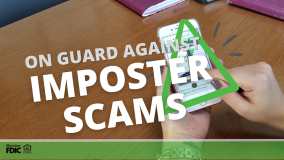Imposter Scams
Imposter Scams

Source: Federal Trade Commission
Imposter scams occur when a scammer calls, texts or emails and pretends to be someone you trust like a government agency, law enforcement, a family member, or business, and they ask you to give them money. People lose a lot of money to these types of scams - sometimes their life savings. There are many different tactics that scammers use, but they tend to make similar promises and threats, or ask you to pay certain ways.
WHAT YOU NEED TO KNOW...
- There is no prize. The person might say you were selected for an offer, or that you've won a lottery, but if you have to pay to get the prize, then it is not a prize.
- You won't be arrested. Scammers pretending to be law enforcement or a government agency may say that you'll be arrested, fined, or deported if you don't pay taxes or some other debt right away with the goal of scaring you into paying. Real law enforcement and federal agencies won't call or threaten you.
- You don't need to decide now. Honest businesses will give you time to think an offer over and get written infomation about it before you commit. Take your time, and if you feel you're being pressured into making a decision on the spot, it's probably a scam.
- Only scammers demand that you pay certain ways. A scammer will insist you pay in a way that makes it hard to get your money back (wire transfer, gift card, cryptocurrency or payment app).
- Government agencies won't call to confirm your sensitive information. No government agency is going to call you out of the blue to ask for sensitive information like your social security number.
- You shouldn't be getting all of those calls. If a company is selling something, it needs your written permission to call you with a robocall. If you're on the National Do Not Call Registry, you shouldn't get live sales calls from companies you haven't done business with before. Those calls are illegal. If someone is already breaking the law by calling you, what they're calling about is probably a scam.
HOW TO PROTECT YOURSELF...
- Be suspicious. Government agencies do not call asking for money of information.
- Never pay with a gift card, wire transfer or cryptocurrency.
- Don't trust your caller ID. With today's technology, scammers are able to have a fake name or phone number show up on your caller ID to make it seem more believeable.
- Check with the real agency, person or company. Look up the number of the person or organization yourself and call to find out if they're trying to reach you.
The Federal Trade Commission has a very helpful infographic to help you spot and navigate Imposter Scams, that you can view here.
To learn more about phone scams, check out this article by the Federal Trade Commission.

